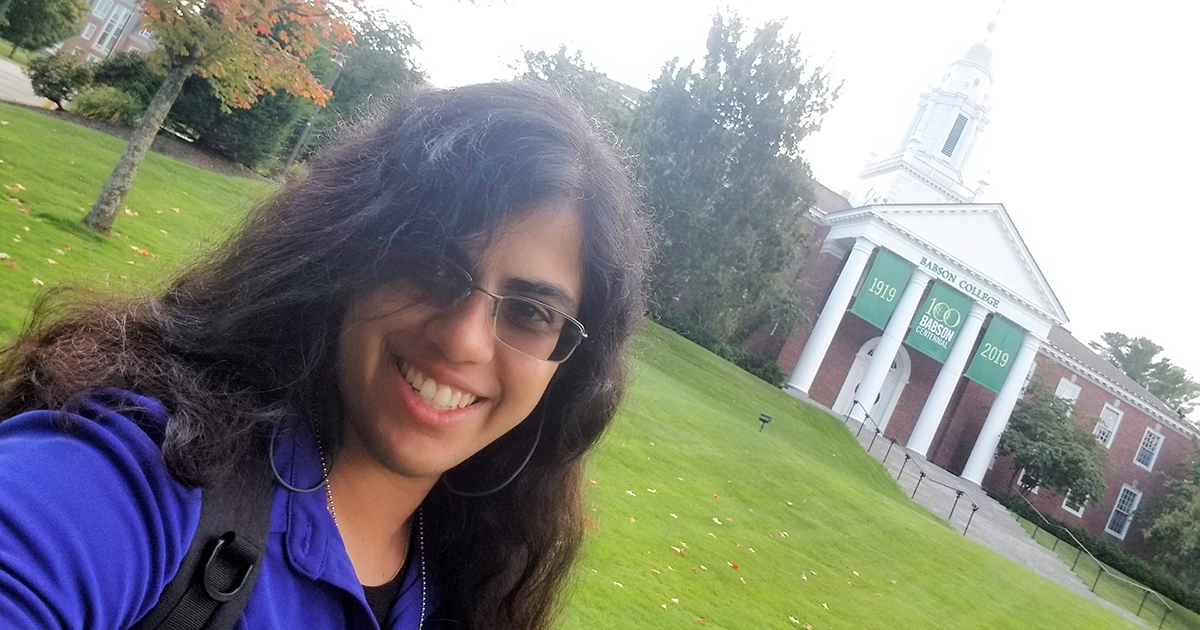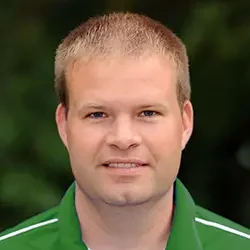People of Babson: Saadia Ahmad

In slightly over a year at Babson College, Saadia Ahmad has made a significant impact in what some might view as an unenviable position—dealing with conflict on a daily basis as the coordinator of conflict resolution in the Office of Community Standards. In addition to working full time in conflict resolution, Ahmad is seeking her second advanced degree as a Babson MBA candidate. She also earned her master’s degree in conflict resolution from UMass Boston in 2017 and her bachelor’s degree from Providence College, where she is an adjunct professor.
The Q&A
What inspired you to enter the field of conflict resolution?
“What initially drew me to the conflict resolution world was my experience as a Muslim at a Catholic college. I immersed myself into the Catholic tradition and building relationships with classmates, professors, and priests. The collective result of these experiences was a more sophisticated, integrated sense of myself, my Islamic faith, and my relationship with God. I was wowed by how much we all benefit when religious diversity is engaged with from a place of curiosity rather than a desire to convert. The discrepancy between my positive experiences and the realities of tension across lines of difference is what inspired me to study the field and facilitate better ways forward.”
Many people seek to avoid conflict, but you embrace it as a mediator for students experiencing conflict. How do you approach it?
“Embracing conflict is sometimes scary even for trained mediators! Very few of us grow up learning conflict-resolution skills. This is sometimes why students avoid or struggle with managing conflict effectively, and I try to bring that empathy into every student interaction. I challenge students to consider that a conflict, when handled well, is an opportunity to do things better and strengthen relationships.”
You also have been co-leading the Employee Resource Group (ERG) in race conversations, having robust discussions with Babson staff about the distressing events of the year. What have you learned?
“What I have learned about the conflict resolution field is that facilitators have an ethical responsibility to ensure that our philosophy mitigates how power, privilege, and systemic inequities impact all conversations and conflicts. What I have learned about our Babson community is that, like our nation, we are each at different stages of knowledge and receptiveness to being uncomfortable, challenged, and called to action when there is a discrepancy between who we say we are and how others experience us and our actions. What I try to remind myself and our ERG community is that we cannot let ourselves believe that saying #BlackLivesMatter on social media and standing against prejudiced rhetoric of public leaders, as imperative as these are, will alone heal the sin of racism, bring forth justice, and absolve us of our responsibility to take action where we can make a difference. If we do not take a moment to figuratively and literally look at ourselves in the mirror each day to consider and address how we are perpetuating racism beyond the obvious ways, we run the risk that we are upholding a system that disadvantages and oppresses people of color and especially Black people. A lack of explicit intention is not an excuse anymore. What I am most moved by is the vulnerability and grace with which people have grappled with these matters. I am grateful to have the trust of this community to facilitate these conversations and initiatives at such a critical crossroads for our College and our country. I do not take such a responsibility lightly, and I strive to live by example when we discuss the need to not just preach words of anti-racism, but practice them, too, and challenge those around us to do the same. The countless lives of people of color and their quality of life depend on our willingness to step up.”
“What I am most moved by is the vulnerability and grace with which people have grappled with these matters. I am grateful to have the trust of this community to facilitate these conversations.”
Saadia Ahmad, coordinator of conflict resolution
You also have a growing interest in consulting, management, and financial fields. What led you to discover these areas and how do you hope to pursue this path moving forward?
“We live in a world that is polarized and divided, and one of these divisions is between the business and nonprofit worlds. Staying true to my training as a mediator, I hope to play a part in each world and to serve as a bridge-builder of sorts: to challenge the nonprofit world to be more strategic, concrete, and sustainable in pursuing their missions, and to challenge the business world to uphold its ethical and social responsibilities to do good for those around us and our planet. Specifically, my goal is to facilitate and institutionalize conflict resolution processes in corporate, nonprofit, and public service settings as a normalized way of life as I have at Babson. As a part-time student in the evening MBA program, I’ve been incredibly excited to find that every professor I have studied with emphasizes the responsibility of companies to conduct business in a way that centers on the public good, environmental sustainability, and diversity, equity, and inclusion.”
Two More for Saadia Ahmad
What does Babson mean to you?
“Being immersed in the Babson world as a staff member and as a student has helped me realize that I have been an entrepreneur throughout much of my personal and professional life, and being here has felt like coming home, finding a family, and learning a language that I instinctively knew was out there but had not yet discovered.”
Right now, what are you …
- Reading? “I alternate between The Challenge Culture: Why the Most Successful Organizations Run on Pushback by Nigel Travis, Meet Me at The Door by Ernest Gordon, and Dark Nights of the Soul by Thomas Moore.”
- Watching? “I started ‘Madam Secretary,’ and I’m on my second viewing of ‘Lucifer,’ which raises thought-provoking questions on our assumptions about religion, faith, and doubt.”
- Listening to? “My go-to podcasts are Interfaith Voices Podcast, The DOPE Muslim Woman Podcast, and the Providence College Podcast. The songs I’m playing are ‘Stand Up’ by Cynthia Erivo, ‘Famous For (I Believe)’ by Tauren Wells, and ‘Together’ by For King & Country.”
- Doing in your free time? “Between my full-time role as a staff member and a part-time MBA student, I’m occupied by Babson almost 24/7! I’ve started taking solo road trips. My most recent adventures were to Portland, Maine, and Burlington, Vermont.”
Posted in Community




